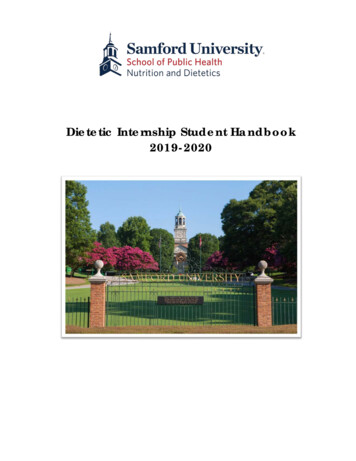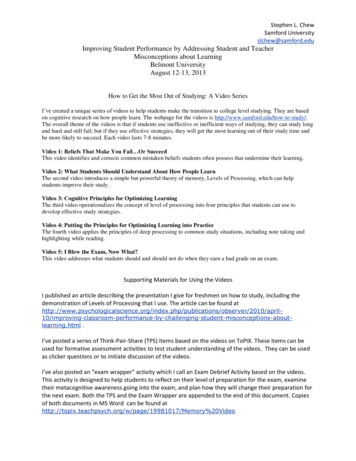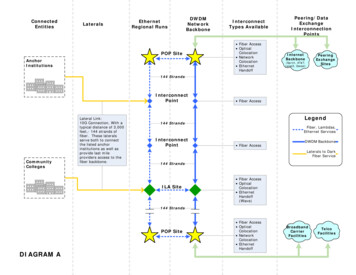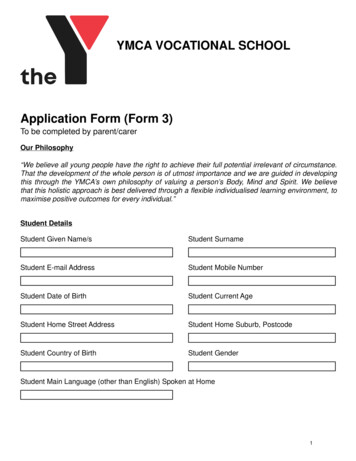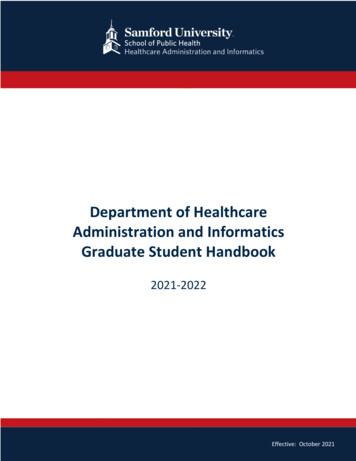
Transcription
Department of HealthcareAdministration and InformaticsGraduate Student Handbook2021-20221Effective: October 2021Effective: October 2021
ContentsWelcome Letter from the Department Chair . 5Purpose of the Handbook . 6Introduction and Overview . 6A Brief History of Samford University . 6A Brief History of the College of Health Sciences . 6College of Health Science Organizational Chart . 7A Brief History of the School of Public Health . 8A Brief History of the Department of Healthcare Administration and Informatics . 8Healthcare Administration and Informatics Organizational Chart. 9Mission Statement of Samford University . 9Department and Program Mission, Vision, and Values . 10MISSION . 10VISION . 10CORE VALUES . 11Graduate Degree Programs . 11Master of Healthcare Administration (M.H.C.A) . 11M.H.C.A. Joint Degrees . 11M.H.C.A./Dietetic Internship . 12M.H.C.A./M.B.A. . 12Fast Track Master of Healthcare Administration (B.S./M.H.C.A.) . 12Graduate Healthcare Administration Program Outcomes . 12Master of Science in Health Informatics and Analytics . 13Pharm.D./ M.S.H.I.A. 13Fast Track Master of Science in Health Informatics and Analytics (B.S./M.S.H.I.A.) . 13Graduate Health Informatics and Analytics Program Outcomes. 14Full Time vs Part Time Status . 14Program Competency Models . 14Healthcare Administration . 14Competency Evaluation . 15Competency Scale and Definitions . 15Master of Healthcare Administration Competencies . 16Admission Requirements . 17Fast Track Master of Healthcare Administration Admission Requirements . 17Master of Healthcare Administration . 182Effective: October 2021
Fast Track Master of Science in Health Informatics and Analytics (B.S./M.S.H.I.A.) . 19Master of Science in Health Informatics and Analytics . 20Academic Policies. 21Progression Policies . 21Fast Track Programs . 21Graduate Healthcare Administration and Informatics . 22Time Limit for Program Completion . 23Grading Policy . 23Grading Scale . 23Incompletes . 23Policies regarding course failure . 24Grade Appeal Policy . 24Withdrawal Policy . 24Readmission Policy. 24Grievance Procedure . 24Academic Integrity . 25Registration . 25Schedule Adjustment . 25Graduate Transfer Credit Policy . 25Program Requirements . 25Laptop Policy . 25Internship Requirements . 26MHCA 612 Healthcare Administration Graduate Internship . 26Academic Calendar . 26Graduation Requirements and Commencement. 26Professionalism . 27Graduate Student Expectations . 27Attendance and Access to Canvas Policies . 28Online Attendance Policy . 28Access to Canvas Courses . 28Internship Attendance Policy . 28Campus Information and Services . 29COVID - 19 . 29Technology Needs . 30Books and Supplies . 303Effective: October 2021
Campus Safety . 31Inclement Weather . 31Emergency Readiness . 31Americans with Disabilities Act . 31Title IX . 31Sexual Harassment Policy . 32Student Bereavement Policy. 32Communication Resource Center . 32Counseling Services. 32Library Services . 32Electronic Mail . 33Samford Campus Portal . 33Parking . 33University Health Services . 33Financial Services . 33Family Educational Rights and Privacy Act (FERPA) . 34Student Conduct . 34Background & Drug-Screen Policy . 35Health Insurance . 35APA Citation Style and Format . 35Healthcare Administration and Informatics Department Canvas Page . 35Healthcare Administration and Informatics Advisory Board . 35Student Organization, Professional Associations, and Honor Society . 36This is Samford H.E.A.L.T.H. . 36Professional Associations . 36Upsilon Phi Delta Honor Society . 36Revisions . 374Effective: October 2021
Welcome Letter from the Department ChairWelcome to Healthcare Administration and InformaticsI would like to extend a warm and heart-felt welcome to you on behalf of the faculty and staff in theDepartment of Healthcare Administration and Informatics (HAI) in the School of Public Health. We arepleased and excited that you are pursuing one of our degree options.This is a challenging, yet exciting time to be in healthcare. The ever-changing dynamics in public health,policy and law, mergers and partnerships, access to care, data management and analytics requirescompetent individuals with the desire for life-long learning, critical thinking skills, and compassion. Asone of our alumni put it best, “I don’t think you can go into healthcare administration without having aheart for wanting to see sick patients get well.”Our primary focus is to create a rich interprofessional learning environment that assists you in yourpursuit of knowledge, your professional goals, and serving others. Programs include experientiallearning opportunities, access to professional development, and networking opportunities. We areprepared to guide, support, and do our very best to mentor you as you expand your skills andknowledge.We are proud that 100% of our HAI undergraduates are employed within a year or accepted intograduate programs and 100% of our M.S.H.A. graduates are employed within 3 months of completingour program.Wishing you success and blessings,Carol J. Ratcliffe, DNP, RN, COI, FACHEProfessor and Chair, Department of Healthcare Administration and Informatics5Effective: October 2021
Purpose of the HandbookThis handbook is a reference and guide for students enrolled in the graduate HealthcareAdministration and Informatics programs. The Samford University Student Handbook providesmost of the policies and procedures for graduate students. The Samford University StudentHandbook supersedes this handbook in any areas of conflict and will be followed. This handbookprovides the Department of Healthcare Administration and Informatics specific policies andprocedures. It is the primary source of policies and procedures for graduate students enrolled inHealthcare Administration and Informatics programs.Introduction and OverviewA Brief History of Samford UniversitySamford University is the largest privately supported and fully accredited institution for higherlearning in Alabama. Founded by a group of education, economic, and religious leaders, theschool was chartered in 1841 and opened its doors on January 3, 1842, in Marion, Alabama asHoward College. It has survived two destructive fires and the partial paralysis of the Civil Warand Reconstruction. In 1887 it was relocated to Birmingham, and in 1957 the institution wasmoved to its present campus. In 1920 Howard College gained membership in the SouthernAssociation of Colleges and Schools – Commission on Colleges (SACS-COC). The establishmentof the Teacher Education Division in 1914 and the Division of Pharmacy in 1927 highlightedthe school’s continuous growth throughout the years. The historic and renownedCumberland School of Law, established in 1847 in Lebanon, Tennessee was acquired in 1961.The University now consists of the Howard College of Arts and Sciences, Brock School ofBusiness, Orlean Bullard Beeson School of Education, School of the Arts, Beeson School ofDivinity, Cumberland School of Law, and the College of Health Sciences which includes IdaMoffett School of Nursing (IMSON), McWhorter School of Pharmacy, School of HealthProfessions, and School of Public Health. Samford University was founded by Baptists ofAlabama, and today maintains a close relationship with the Alabama Baptist State Convention(Southern Baptist Convention). While the university cherishes this relationship and sees itsrole centered on Christian belief, Samford is open to students of all denominations and faithtraditions.A Brief History of the College of Health SciencesIn 2013, Samford announced the creation of its College of Health Sciences, an ambitiousinitiative that combined the strengths of Ida Moffett School of Nursing, McWhorter School ofPharmacy, the School of Health Professions and the School of Public Health to provide arevolutionary learning experience for students pursuing careers in health care. The College ofHealth Sciences embraces today’s models for interdisciplinary, collaborative teams of healthcare professionals by providing students in all four schools opportunities to learn alongside6Effective: October 2021
students in other health professions. Graduates are uniquely equipped to succeed in today’shealth care environment.The College focuses on preparing students to be READY through: Students and faculty pursuing a rigorous academic program that challenges at every level. Students earn considerably more clinical experience than required by the variousaccrediting organizations to become compassionate employable people who have hadhands-on, patient-care experience. The curricula across all four schools fosters inter-professional collaboration to betterprepare graduates to work on inter-professional care-giving teams. As a part of Samford University, everything we do is grounded in the Christian faith.College of Health Science Organizational Chart7Effective: October 2021
A Brief History of the School of Public HealthThe School of Public Health is the newest of the four schools in the College of Health Sciencesbut houses the oldest program in the College. The oldest program is the Department ofNutrition and Dietetics which began in 1933. It was joined by the Departments of Social Workand Public Health in 2013. The Department of Health Informatics and Information Managementbegan in 2015. In 2016, the Department of Healthcare Administration was implemented. InMay 2020, the Departments of Healthcare Administration and Healthcare Informatics andInformation Management were integrated into one and the name was changed to theDepartment of Healthcare Administration and Informatics.A Brief History of the Department of Healthcare Administration and InformaticsThe Department of Healthcare Administration and Informatics is dedicated to creating leaderswho embrace service-minded leadership and demonstrate a commitment to Christian valuesand principles through serving the community. Originally established separately in 2015 (HealthInformatics and Information Management) and 2016 (Healthcare Administration), theDepartment of Healthcare Administration and Informatics (HAI) was formed following theirmerger in May 2020. An interprofessional curriculum is provided through faculty within HAIand the Department of Public Health. Dependent upon the degree major, students will alsotake courses in the Brock School of Business and Howard College of Arts and Sciences. Degreesare offered at both the undergraduate and graduate levels. The undergraduate HealthInformation Management program offerings were revised and transitioned to HealthInformatics and Analytics in fall 2021.Since the initial approval of the undergraduate and graduate healthcare administration andinformatics and analytics program offerings, collaboration with departments within the Collegeof Health Sciences and across Samford University has facilitated the expansion of degreeofferings to include the following:Undergraduate Degree Programs Bachelor of Science in Healthcare Administration Fast-Track B.S./M.H.C.A. (M.H.C.A. online) Minor in Healthcare Administration Bachelor of Science in Health Informatics and Analytics Fast-Track B.S./M.S.H.I.A. (M.S.H.I.A. online) Minor in Health Informatics and Analytics Sports Injury Prevention Analytics (B.S. in Health Informatics and Analytics majors only)Graduate and Joint Degree Programs Master of Healthcare Administration (M.H.C.A.) online Master of Science in Health Informatics and Analytics (M.S.H.I.A.) online Pharm.D./M.S.H.I.A. (M.S.H.I.A. online) Dietetic Internship/M.H.C.A. (M.H.C.A. online)8Effective: October 2021
M.H.C.A./Master of Business Administration onlineHealthcare Administration and Informatics Organizational ChartUniversity and Department AccreditationThe university is accredited by the Commission on Colleges of the Southern Association ofColleges and Schools Commission on Colleges (SACSCOC) to award bachelors, masters,educational specialist and doctoral degrees. This status was most recently affirmed in 2018,continuing a relationship that Samford has enjoyed with SACSCOC since 1920.The Commission on the Accreditation for Healthcare Management Education (CAHME)reviewed and approved Samford University’s Master of Healthcare Administration program’seligibility for CAHME candidacy in July 2019. This review and approval are a critical initial stepin the multi-phase process toward the attainment of CAHME accreditation.Mission Statement of Samford UniversityThe mission of Samford University is to nurture persons in their development of intellect,creativity, faith and personhood. As a Christian university, the community fosters academic,career and ethical competency while encouraging social and civic responsibility, and service toothers.The Samford community values lifelong: Belief in God, the Creator of heaven and earth, and in Jesus Christ, His only Son, ourLord. Engagement with the life and teachings of Jesus Learning and responsible freedom of inquiry9Effective: October 2021
Personal empowerment, accountability, and responsibilityvocational success and civic engagementSpiritual growth and cultivation of physical well-beingIntegrity, honesty, and justiceAppreciation for diverse cultures and convictionsStewardship of all resourcesService to God, to family, to one another, and to the communityDepartment and Program Mission, Vision, and ValuesMISSION STATEMENTSDEPARTMENTThe mission of the Department of Healthcare Administration and Informatics is to prepareservice-minded leaders and health professionals in a Christ-centered environment throughcompetency-based, interprofessional education that is committed to excellence.PROGRAMSThe mission of the Master of Healthcare Administration (M.H.C.A.) as part of a Christianuniversity, is to nurture and prepare early career healthcare management professionals to serveacross diverse healthcare settings. An interprofessional experience is a hallmark of our program.This experience is grounded in our interprofessional curriculum and interdisciplinary faculty.Practical experiences alongside healthcare leaders and executives are tailored to a student’sinterests and professional goals. Educational experiences inside and outside the classroomprovide the knowledge and skills students need to be successful healthcare managers,administrators, and leaders. We strive to prepare professionals that are committed to promotinghealth and well-being for those they serve as part of an interprofessional and collaborativehealthcare team. Program experiences focus on core competencies and lifelong learning so thatgraduates are positioned to advance their career and answer their calling. Our program isprovided by highly qualified faculty engaged in scholarship, practice, and service to thehealthcare management profession and community.The mission of the Master of Science in Health Informatics and Analytics (M.S.H.I.A.) programis to prepare health informatics and analytics professionals in a Christ-centered environmentthrough an innovative, interprofessional curriculum focused on critical thinking and datadriven decision making to improve outcomes and promote health equity.VISIONWe aspire to prepare influential and visionary healthcare professionals who make a positive impact ontheir communities.10Effective: October 2021
CORE VALUESThe Department of Healthcare Administration and Informatics values the following as central toour success: Christian-Based Education: We are committed to integrating our Christian faith andbeliefs in our delivery of healthcare administration education. Excellence: We pursue excellence within the department through opportunities forachievement in scholarship, service and research. Practice-Ready: We are committed to preparing students who are ready to practice upongraduation. Respect for diversity: We are committed to respecting the differences in others bylearning to appreciate the different cultures of the populations that we serve. Integrity: We are committed to operating in an environment that values honesty, fairnessand the highest ethical standards to sustain a community of trust. Empowerment: We encourage personal accountability for success through sharedgovernance in academic pursuits.Graduate Degree ProgramsMaster of Healthcare Administration (M.H.C.A)The Master of Healthcare Administration (M.H.C.A) is the terminal degree required forexecutive management positions in healthcare. The M.H.C.A. program provides acompetency-based curriculum that prepares students for leadership roles within avariety of different healthcare settings. The M.H.C.A. is a 48-credit hour online, fivesemester asynchronous program. This program may also be completed part-time ineight-semesters. The curriculum is designed to provide competency in communication,leadership professionalism, business knowledge, and healthcare systems as well as acompetitive edge in project management and quality improvement. A minimum 120hour internship is required for students with less than five years clinical or healthcaremanagement experience. Students who have five years of leadership experience mayelect to complete an Advanced Leadership Project with a senior healthcare executivementor. Internship sites, projects, and mentors are coordinated through and approvedby the course coordinator.M.H.C.A. Joint DegreesThe university offers M.H.C.A. joint degrees with the Dietetic Internship Program in theSchool of Public Health and the Master of Business Administration in the Brock School ofBusiness.11Effective: October 2021
M.H.C.A./Dietetic InternshipStudents pursuing the Dietetic Internship in the School of Public Health may also apply for theMaster of Healthcare Administration (M.H.C.A.) Students must apply and meet the admissioncriteria, as well as adhere to the academic policies and standards, of the joint program. The 70hour joint program is offered full-time online.M.H.C.A./M.B.A.Students pursuing the Master of Healthcare Administration (M.H.C.A.) may also applyfor the Master of Business Administration degree (M.B.A.), offered through the BrockSchool of Business. Students must apply and meet the admission criteria, as well asadhere to the academic policies and standards, of the joint program. Students apply tothe M.B.A. program at the end of their first semester of M.H.C.A. courses by contactingElizabeth Gambrell, Associate Director of Academic Programs in the Brock School ofBusiness at eagambre@samford.edu. The 69-hour joint program is offered full-timeonline and can be completed in 8 semesters. Additional M.B.A. courses may be requireddependent upon pre-requisite courses completed by the applicant.Fast Track Master of Healthcare Administration (B.S./M.H.C.A.)The Fast-Track Master of Healthcare Administration program (B.S./M.H.C.A.) is ideal forstudents who know early on in their academic career that they have a calling to servethrough dynamic leadership in the healthcare industry. Students apply for the programat the end of their freshman year. Students begin undergraduate-level coursework inthe Department of Healthcare Administration in the fall of their sophomore year andbegin taking courses toward the M.H.C.A. during the fall of their senior year ofundergraduate studies. Students are required to enroll in courses the summer betweentheir third and fourth year of study to complete their undergraduate requirements. Atthe end of their fifth year of study, the student will be awarded a B.S. in HealthcareAdministration and Master of Healthcare Administration degrees. Stud
Moffett School of Nursing (IMSON), McWhorter School of Pharmacy, School of Health Professions, and School of Public Health. Samford University was founded by Baptists of Alabama, and today maintains a close relationship with the Alabama Baptist State Convention (Southern Baptist Convention).
